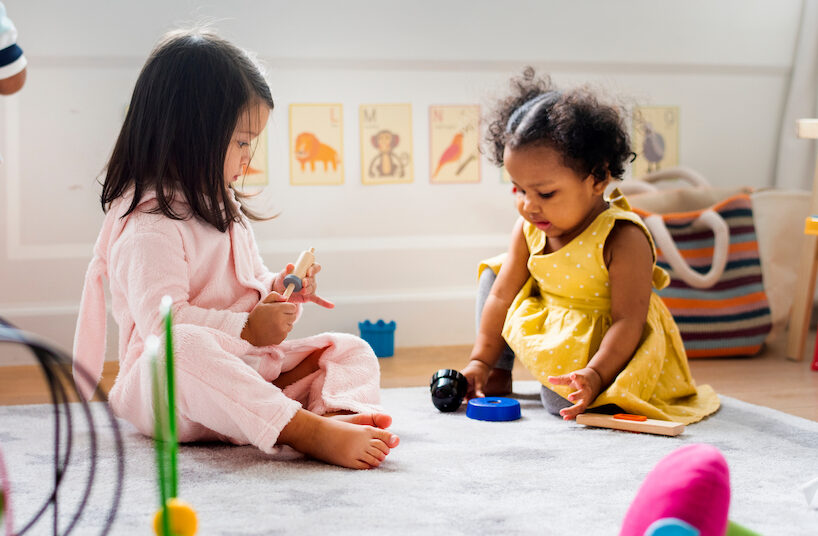Is my child ready for grade 1? This question often pops in and out of parents minds throughout the first 6 years of their child’s life. There are many factors that go into ensuring grade 1 readiness, both academically and socially.
In general, enrolling your children in junior and senior kindergarten is the simplest way to ensure your child meets the necessary milestones for grade 1. As per the ministry of education, “full day kindergarten is designed to give your child a stronger start in school and in life… children are involved in a variety of learning activities to help them investigate, problem solve and collaborate, under the guidance of an educator team.”
Enrolling your child in kindergarten will also provide YOU with the most support when it comes to meeting those developmental milestones. It can be difficult to know what you should expect at which age but having kindergarten educators in your child’s life will give you an unparalleled resource.
“The enthusiasm that you bring to educational activities will resonate with your child and is the key driver in their future success”
– Margaret Czajkowski, Childventures Executive Director
That being said, many parents that we come across want to make sure that they are doing everything possible to ensure their children start grade 1 on the right foot. To help ease your mind, we have developed a number of different tactics that you can do at home to supplement the education that your children are receiving in kindergarten.
The areas that we will be focusing on are:
- Language Development
- Physical & Motor Development
- Cognitive Development
- Emotional & Social Development
Language Development:
- Reading
- Read at home with your child!
- Go to the library! Libraries are magical to children and it gives them an opportunity to pick for themselves what they want to read.
- Key tip: at this age, really focus on having your child make predictions while you’re reading together.
- Literacy
- While reading, if your child is struggling with particular words, help them to break it down into its phonics.
- Have them spell words in everyday conversation. Merge casual conversations with learning opportunities, for example, ‘oh look there’s a bird, how do you spell bird?’
- Printing
- Have your child keep a journal! This gives children the opportunity to develop their printing while also working on their literacy skills. It can also help immensely with emotional regulation. Just a simple, ‘what did you do today’ will suffice!
- Key tip: encourage phonetic spelling, this will ensure that your child doesn’t get overly frustrated if they don’t know how to spell all of the words that they’re trying to express.
Physical & Motor Development
- Fine Motor
- Take stickers on and off of things. This helps develop those small muscles and can be made into a simple and fun art activity.
- Also, using a hole puncher helps to strengthen hand and finger muscles. This is a random one, but in our experience, children love it.
- Gross Motor
- Go to the playground! Make as many trips as you can spare to the playground to help your child develop their bigger muscles.
- Specifically, climbing up and down stairs and swinging on poles really helps to develop key muscles. Also as an added bonus, it will tire them out!
Cognitive Development
- Math
- Take them to the store with you, and let them count the change that you owe! Although this can be time consuming, it’s a wonderful way to develop early math skills.
- Reasoning/Memory
- Give them three step instructions to simple tasks and have them follow through
- They have to hear it, remember it and then go do it
- Give them three step instructions to simple tasks and have them follow through
Emotional and Social Development
- Self Regulation
- Practice taking turns! When going into grade 1, it is important that children know how to take turns and when it is time to stop using a toy and give it to their peers. This is NOT the same as sharing. Often these get mixed up and therefore overlap in a child’s mind. Sharing is when they use an item together vs. turn taking which is when one child is using it independently for a certain amount of time before giving to their friend for a designated period.
- Recognizing and reacting to the emotions of their peers is also a key milestone. Both of these can be easily developed by ensuring consistent play dates with a variety of friends!
- Independence
- Let them do things themselves. Often, given the fast paced lifestyle that the majority of parents have, it can be more efficient to do things for your child instead of taking the time to let them do it themselves. However, it is very important that you allow your child to wash their hands on their own, brush their teeth, serve themselves, etc. so that they can develop the independence that will be pivotal in grade 1.
There is no shortage of ways to ensure your child’s success in elementary school. If the above examples don’t work with your schedule or you’re concerned about your child’s development, always know that you can reach out to the educators at the kindergarten program you are enrolled. With so many options available, it can be overwhelming to say the least.
But overall, parent participation is key. Whether its setting up playdates or participating in family reading, the enthusiasm that you bring to educational activities will resonate with your child and is the key driver in their future success.


